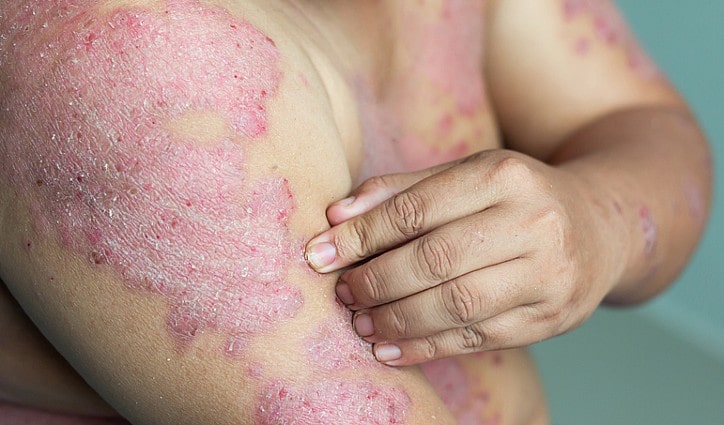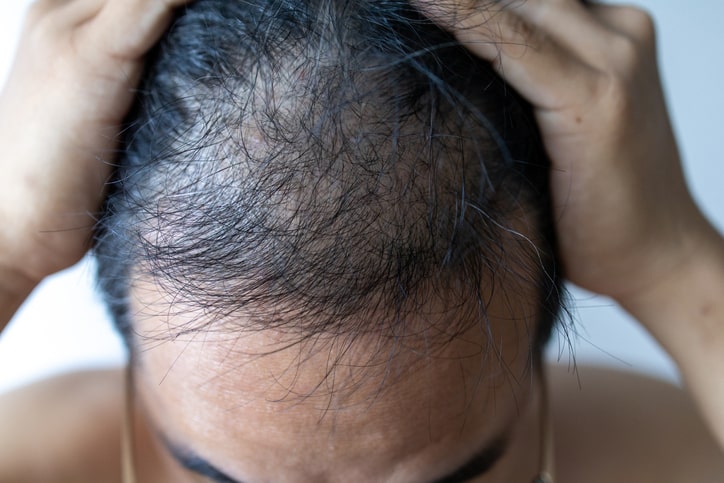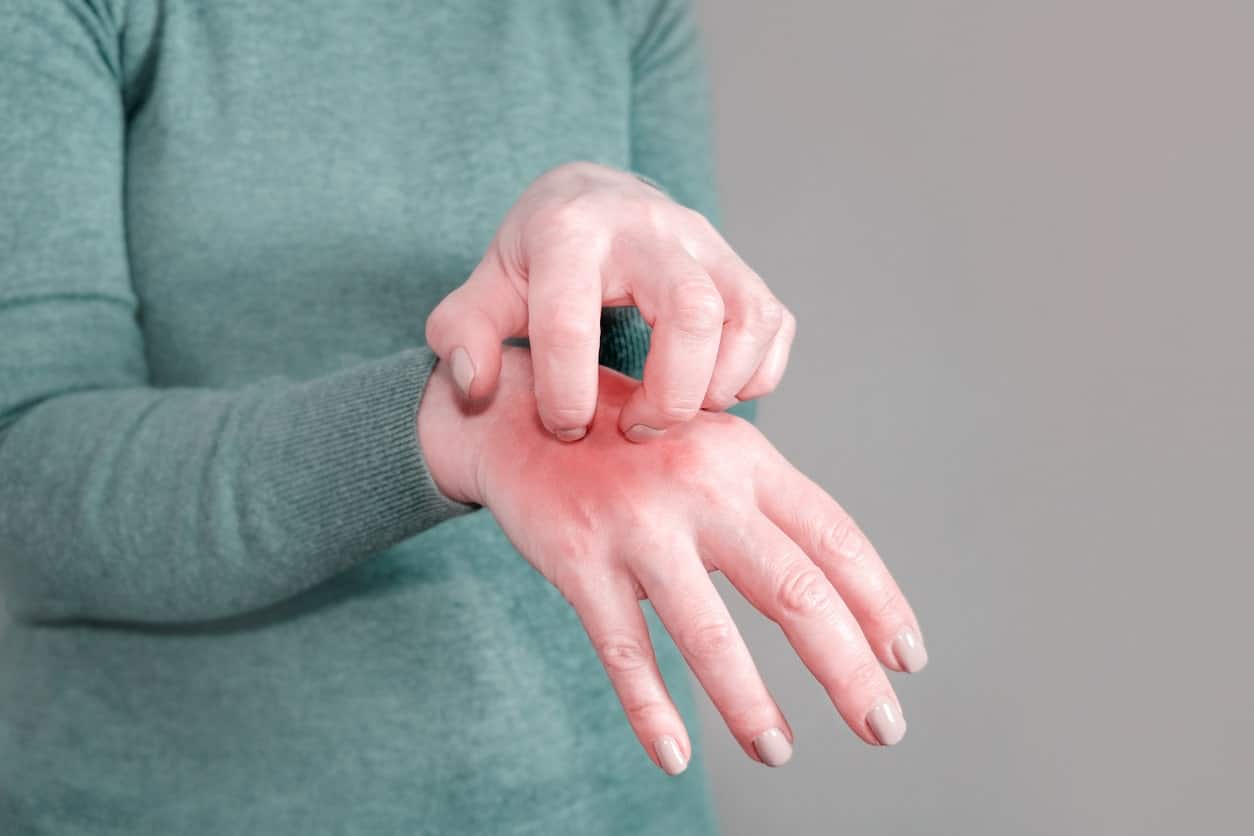Is psoriasis worse in men, or have we been wrong this whole time?
What do Kim Kardashian, Kris Jenner and Cara Delevingne have in common? Apart from being gorgeous Hollywood celebrities, these A-listers have psoriasis, a skin condition that’s characterised by red, scaly and itchy patches. Although psoriasis is known to be slightly more prevalent in women, it tends to be severe in men.
Why is this so, and what can we do to prevent flare ups? Let’s find out.
What is psoriasis?
Psoriasis is a skin condition that is usually characterized by red, scaly, and itchy patches. On most occasions, this chronic skin condition will affect your elbows, knees, scalp as well as trunk. Being a chronic skin disease, it somehow tends to occur in cycles, sometimes flaring for some weeks or even months before subsiding for a while.
What causes psoriasis?
Psoriasis is believed to be triggered or rather caused by the immune system. Generally, your immune system features cells that help your body to fend off disease-causing pathogens. However, with psoriasis, your body's self-defense mechanism, which is your immune system, somehow overreacts, ultimately forcing the immune cells to move to your skin's uppermost layer to falsely act as if they are healing a wound.
In turn, this triggers your skin cells to grow relatively faster, resulting in the buildup of thick and scaly cells in your skin, which is medically described as psoriasis. During this process, the hypersensitive immune cells make the blood cells widen or dilate, and equally cause more immune cells to move towards your skin surface. As earlier explained, the result is an unending cycle whereby newer cells are made fairly faster, in days or months.
Ultimately, the dead skin cells can't fall off quickly enough, leading to the formation of plaques. This will only cease when an effective treatment interrupts the cycle.
So, why do men experience psoriasis differently?
Before we delve deeper into why men experience psoriasis quite differently, let us first examine the symptoms associated with it. Generally, the symptoms of this chronic condition vary from one patient to another. The most common symptoms usually include the presence of red patches of skin that are covered in silvery scales that are somewhat thick, small scaling spots, soreness, burning or itching, swollen and stiff joints as well as thickened ridged or pitted nails.
It is also worth mentioning that these patches usually range from a few spots of scaling to numerous eruptions covering large skin sections. Usually, psoriasis will attack areas such as legs, elbows, knees, lower back, scalp, palms, face, and soles of your feet. As previously explained, these symptoms can go through episodes or cycles, flaring for weeks or months before subsiding for some time as well.
What causes male psoriasis?
Research has shown that severe psoriasis is much more prevalent in men compared to women. Generally, psoriasis is just as prevalent in males as it is in females. However, this doesn't reveal much about the real experience in men and women. With psoriasis, numerous factors such as potential triggers, the severity of your symptoms, the type of psoriasis as well as treatment preferences affect men and women quite differently.
For both males and females, it is how your system responds to these potential triggers that can make your psoriasis flare-up. Studies have proven that both stress and smoking tend to exacerbate psoriasis symptoms more in females.
In regards to associated conditions, many health conditions linked to psoriasis include heart disease, depression, diabetes, obesity, and alcohol consumption. In regards to obesity, women with psoriasis have been shown to fare worse than their male counterparts. In terms of severity, men generally tend to experience more severe symptoms than their female psoriasis victim counterparts.
What triggers psoriasis?
It is worth noting that external triggers may trigger a new bout of psoriasis. These triggers are not the same for all psoriasis patients and could also change over time.
Stress
Studies have shown that high-stress levels can potentially trigger a flare-up of psoriasis symptoms. If you can learn how to reduce or manage your stress levels, you can possibly prevent flare-ups.
Consumption of alcohol
Research has also proven that heavy consumption of alcohol can potentially exacerbate your psoriasis-associated symptoms. If you frequently take alcohol, you'll somehow experience more regular psoriasis episodes. Minimizing your alcohol consumption is not only a great way to reduce your risk of a variety of health conditions, but to protect the health of your skin as well.
Injury
An accident, a scrape, or cut can also exacerbate your psoriasis symptoms.
Infection
As already mentioned, psoriasis occurs when your immune system falsely or mistakenly attacks the healthy cells of your skin. If you are already battling a certain infection or are generally ill, your immune system will ultimately go into overdrive to fend off infection, which may, in turn, trigger a psoriasis flare-up.
Medications
Certain medications including those used to treat high blood pressure, malaria, or those used for mental health disorders.
Cold, dry weather
Is psoriasis a serious disease?
It is imperative to note that there are several types of psoriasis, with each type affecting different parts of your body: The most common types of psoriasis include:
Plaque psoriasis
This has been proven to be the most common type of psoriasis and is usually characterized by plaques that are covered in silvery scales. And these plaques can attack nearly any part of your body. However, it usually affects your lower or scalp.
Guttate psoriasis
This type commonly affects children as well as young adults and is usually triggered by a bacterial infection, including strep throat. It is usually characterized by small, scaling lesions on your legs, arms, or even trunk.
Nail psoriasis
Psoriasis can also affect your toenails or fingernails, resulting in abnormal nail growth as well as discoloration. It is worth noting that psoriatic nails are likely to loosen and separate from your nail bed, and in extreme cases, may cause the nails to crumble.
Inverse psoriasis
This type usually affects the skin folds of your breasts, groin, and buttocks.
Pustular psoriasis
Just as the name suggests, this type of psoriasis features highly defined pus-filled lesions that manifest in widespread patches or relatively smaller areas on the palms of your hands and the soles of your feet.
Psoriatic arthritis
Psoriatic arthritis usually causes swollen and painful joints that strikingly resemble arthritis. It is imperative to note that psoriatic arthritis can affect any of your joints, causing stiffness and progressive joint damage which usually result in permanent joint damage.

How do you clear up psoriasis?
It is imperative to mention that psoriasis can potentially put you at a greater risk of developing other health conditions, including obesity, high blood pressure, cardiovascular disease, mental health problems caused by reduced self-esteem, diabetes, eye conditions, among others
While psoriasis has no cure, the good news is that there are numerous medications as well as remedies that can be used to manage the condition and suppress your symptoms as well. So, if you suspect that you might be having psoriasis symptoms, it is high time you consult your doctor who may recommend the best treatment option for you based on the type of your psoriasis and associated symptoms.
References
- Kamiya, K., Kishimoto, M., Sugai, J., Komine, M., & Ohtsuki, M. (2019). Risk Factors for the Development of Psoriasis. International journal of molecular sciences, 20(18), 4347. https://doi.org/10.3390/ijms20184347
- Kaushik, S. B., & Lebwohl, M. G. (2019). Psoriasis: Which therapy for which patient: Psoriasis comorbidities and preferred systemic agents. Journal of the American Academy of Dermatology, 80(1), 27–40. https://doi.org/10.1016/j.jaad.2018.06.057
This article was written and medically reviewed by Dr Ben, M.D on 25/08/21



















